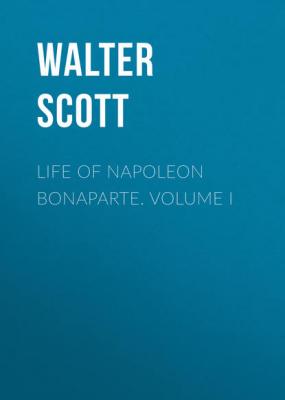1
Southey's Life of Nelson, 2 vols. fcap. 8vo. 1813.
2
Barras, in his official account of the affair of the 13th Vendémiaire, (Oct. 5, 1795,) calls him General Buonaparte; and in the contract of marriage between Napoleon and Josephine, still existing in the registry of the second arrondissement of Paris, dated March 9, 1796, his signature is so written. No document has ever been produced, in which the word appears as Bonaparte, prior to Napoleon's appointment to the command of the Army of Italy.
3
[Sir Walter Scott's Notes have the letter S affixed to them, all of the others having been collected by the Editor of the 1843 Edition.]
4
"But Cæsar's greatness, and his strength, was moreThan past renown and antiquated power;'Twas not the fame of what he once had been,Or tales in old records and annals seen;But 'twas a valour restless, unconfined,Which no success could sate, nor limits bind;'Twas shame, a soldier's shame, untaught to yield,That blush'd for nothing but an ill-fought field;Fierce in his hopes he was, nor knew to stayWhere vengeance or ambition led the way;Still prodigal of war whene'er withstood,Nor spared to stain the guilty sword with blood;Urging advantage, he improved all odds,And made the most of fortune and the gods;Pleased to o'erturn whate'er withheld his prize,And saw the ruin with rejoicing eyes." – Rowe.5
In consequence of the censure passed on the Peace by the House of Commons, the Shelburne ministry was dissolved on the 26th of February, 1783.
6
"During nearly twenty years, ever since the termination of the war with France in 1763, the British flag had scarcely been any where triumphant; while the navies of the House of Bourbon, throughout the progress of the American contest, annually insulted us in the Channel, intercepted our mercantile convoys, blocked our harbours, and threatened our coasts." – Wraxall, 1782.
7
"The deepest wounds were inflicted on the empire during the minorities of the sons and grandsons of Theodosius; and after those incapable princes seemed to attain the age of manhood, they abandoned the church to the bishops, the state to the eunuchs, and the provinces to the barbarians. Europe is now divided into twelve powerful, though unequal kingdoms, three respectable commonwealths, and a variety of smaller, though independent states: the chances of royal and ministerial talents are multiplied, at least with the number of its rulers; and a Julian, or Semiramis, may reign in the north, while Arcadius and Honorius again slumber on the thrones of the south." – Gibbon's Decline and Fall, vol. iii., p. 636.
"It may not be generally known that Louis the Sixteenth is a great reader, and a great reader of English books. On perusing a passage in my History, which seems to compare him to Arcadius or Honorius, he expressed his resentment to the Prince of B*****, from whom the intelligence was conveyed to me. I shall neither disclaim the allusion, nor examine the likeness; but the situation of the late King of France excludes all suspicion of flattery; and I am ready to declare, that the concluding observations of my third volume were written before his accession to the throne." – Gibbon's Memoirs, vol. i., p. 126.
8
On the occasion of the first audience of Mr. Adams, in June, 1785. – See Wraxall's Own Time, vol. i., p. 381.
9
"The sum, after long debates, was fixed by the Emperor at ten million guilders." – Coxe's House of Austria, vol. ii., p. 583.
10
"Joseph the Second borrowed the language of philosophy, when he wished to suppress the monks of Belgium, and to seize their revenues: but there was seen on him a mask only of philosophy, covering the hideous countenance of a greedy despot: and the people ran to arms. Nothing better than another kind of despotism has been seen in the revolutionary powers." – Brissot, Letter to his Constituents, 1794.
11
"In 1780, there were 2024 convents in the Austrian dominions: These were diminished to 700, and 36,000 monks and nuns to 2700. Joseph might have applied to his own reforms the remark he afterwards made to General D'Alten, on the reforms of the French: – 'The new constitution of France has not been very polite to the high clergy and nobility; and I still doubt much if all these fine things can be carried into execution!'" – Coxe, vol. ii., p. 578.
12
"The Pope reached Vienna in February, 1782. He was received with every mark of exterior homage and veneration; but his exhortations and remonstrances were treated with coldness and reserve, and he was so narrowly watched, that the back-door of his apartments was blocked up to prevent him from receiving private visitors. Chagrined with the inflexibility of the Emperor, and mortified by an unmeaning ceremonial, and an affected display of veneration for the Holy See, while it was robbed of its richest possessions, and its most valuable privileges, Pius quitted Vienna at the expiration of a month, equally disgusted and humiliated, after having exhibited himself as a disappointed suppliant at the foot of that throne which had been so often shaken by the thunder of the Vatican." —Ibid., p. 632.
13
The charter by which the privileges of the Flemings were settled, had been promulgated on the entry of Philip the Good into Brussels. Hence this name. – See Coxe.
14
"Joseph expired at Vienna, in February, 1790, at the age of forty-nine, extenuated by diseases, caused or accelerated in their progress by his own irritability of temper, agitation of mind, and the embarrassment of his affairs." – Wraxall, vol. i., p. 277.
15
See Macbeth, act iv., sc. i.
16
The old French proverb bore, —
"Le roi d'Angleterre,Est le roi d'Enfer." – S.17
See the Memoirs of the Marchioness De La Rochejaquelein, p. 48.
18
Ségur's Memoirs, vol. i., p. 76.
 id="litres_trial_promo">
id="litres_trial_promo">